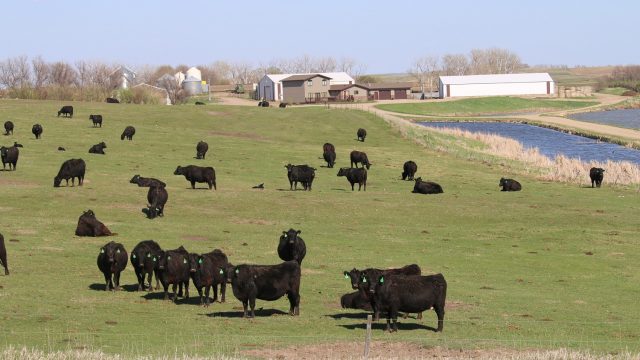North Dakota's Corporate Farming Ban Hasn't Protected Family Farms

Tim Erbele of Streeter, N.D., says his cattle operation is fortunate to be diversified with off-farm income, as well as a 1,200-head confined animal feeding operation. Photo taken May 5, 2016, at Streeter, N.D.(Forum News Service/Agweek/Mikkel Pates)
“It didn’t work, folks.”
That’s what former Grand Forks Herald publisher Mike Jacobs writes in his column today of North Dakota’s corporate farming ban.
Last year the Legislature passed a small reform to the ban to allow the ownership or leasing of up to 640 acres of land for the operation of a dairy farm or swine production facility by a domestic corporation or limited liability company. Currently that sort of business organization of an agriculture enterprise can only happen among blood relatives.
Proponents of the corporate farming ban – namely, the North Dakota Farmer’s Union – say that we need to protect family farms and so referred the Legislature’s reforms to the ballot.
But this is a nonsense argument. Jacobs, who says he has worked with the NDFU in the past to keep the ban on corporate farming, notes that the state has lost thousands of farms while it has been in place:
North Dakota has lost nearly two-thirds of its farms since the 1930s, and the number of farms continues to fall—even though the anti-corporate farming law has been in effect through all of those years.
That’s a remarkable indictment of the status quo. We’re supposed to protect family farms by keeping in place a ban on corporate farming, only the corporate farming ban hasn’t protected family farms.
Many describe this move to open the door, slightly, to corporate farming as a tool that would be used to demolish small time farmers. But that’s completely upside down. Instead this would give those smaller farmers the tools to survive in modern markets.
I don’t have a lot of hope for this argument in the current political cycle. As I’ve noted previously, lawmakers and other supporters of the reform like Agriculture Commissioner Doug Goehring have done next to nothing to defend it in the face of the referendum, and the June primary is less than a month away. Thousands of absentee and vote-by-mail ballots have already been cast.
With the North Dakota Farmer’s Union pouring big money into their campaign, and with no organized coalition formed to make the Legislature’s argument for them, I suspect the referendum will be successful by a wide margin.
But the days are numbered for the corporate farming ban, I think. Whether it’s through the courts or future reforms, agriculture in North Dakota is going to have to embrace the modern world.




